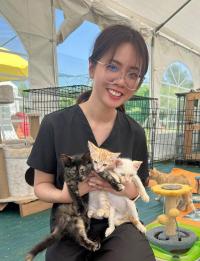Tontong Liu - Italy

This summer, I was fortunate to participate in a three-week global externship at the University of Teramo in Italy, hosted by the Department of Veterinary Medicine. My primary project focused on feline parasitology, particularly investigating the clinical relevance of lungworm infections in cats. This opportunity not only expanded my clinical understanding but also reshaped how I view veterinary medicine in a global, interconnected context.
During my stay, I visited several registered cat colonies cared for by local caretakers. These individuals provide shelter, food, and basic care to feral and community cats. In Teramo, once a colony is registered with the local government, limited health support becomes available—primarily focusing on public health concerns such as parasite control. As part of the research project, I collected fecal samples and recorded clinical signs from these cats, observing their overall health status and tracking signs such as coughing and diarrhea.
From a clinical standpoint, I gained hands-on experience in parasitology diagnostics, including fecal sample collection, Baermann testing, and microscopic identification of parasitic eggs and larvae. I also participated in case reviews and discussions surrounding clinical signs such as coughing, diarrhea, and respiratory distress, learning to connect those signs with regional parasitic threats. I saw how environmental factors, such as climate and population density of feral cats, contribute to parasite transmission, and how veterinarians in Italy adapt their diagnostic and treatment approaches accordingly.


A unique and challenging aspect of this externship was the language barrier. Although my Italian was very limited, and many of the people I interacted with did not speak English fluently, we found ways to collaborate. Initially, I struggled with communication, particularly during the lab work. However, as the weeks progressed, I learned to rely more on observation, body language, translation tools, and—most importantly—shared passion. The kindness and patience of the faculty and fellow students made a strong impression on me. I realized that, despite the linguistic and cultural differences, we were all united by a common goal: to improve animal health and welfare.


